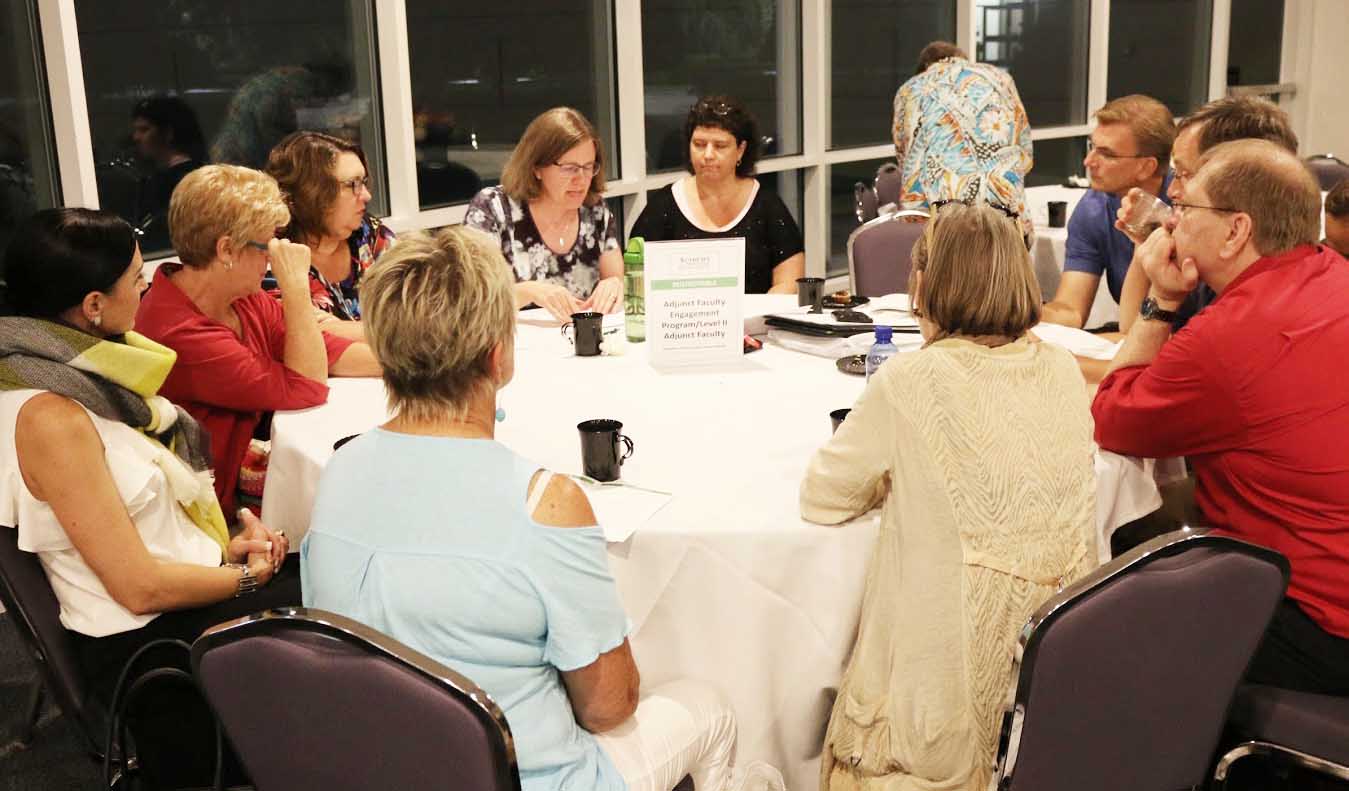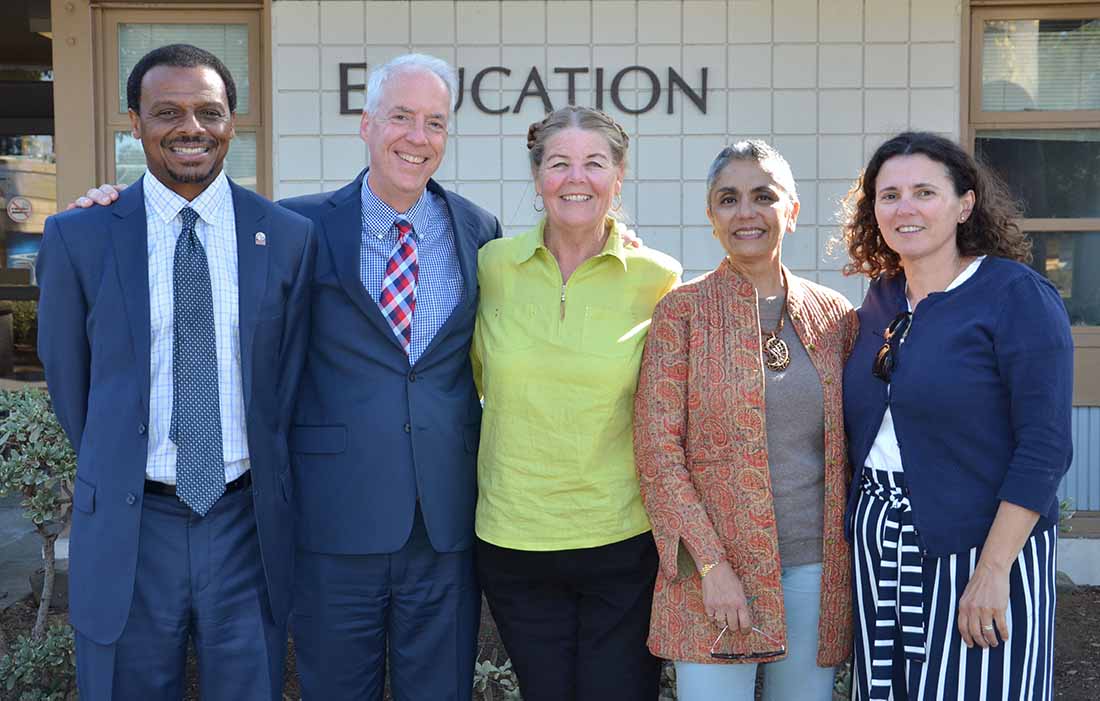
Pullias Center names winners of $15k Delphi Award
Harper College and CSU Dominguez Hills selected for innovative approaches to support adjunct faculty in promoting student success
The Pullias Center for Higher Education at the USC Rossier School of Education today announced two winners of the Delphi Award. Harper College and California State University, Dominguez Hills will each receive $15,000 cash awards to continue their work to support adjunct, contingent and non-tenure-track faculty in promoting student success.
The Delphi Award is an initiative of the Delphi Project on the Changing Faculty and Student Success, an effort of the Pullias Center dedicated to enhancing awareness about changing faculty trends using research and data to better support faculty off the tenure track and to help create new faculty models to support higher education institutions in the future. The award seeks to champion and bring attention to existing efforts to support non-tenure-track faculty and new faculty models, so that other postsecondary institutions might adopt these successful models on additional campuses.
“Non-tenure-track faculty teach the majority of classes at colleges and universities today, yet these instructors often don’t receive the backing they need to be the best teachers they can be,” said Adrianna Kezar, co-director of the Pullias Center and the principal investigator of the Delphi Project. “This award is a much-needed commendation of the institutions that have made a concerted effort to improve working conditions for contingent faculty. I am grateful to both Harper College and CSU Dominguez Hills for leading the charge on this important and pressing concern in higher education.”
According to 2011 data from the National Center for Education Statistics’ Integrated Postsecondary Education Data System, non-tenure-track positions today make up more than 70 percent of instructional faculty in American higher education. The majority of instructional faculty among nonprofit institutions work part-time. Compared to their tenured or tenure-track counterparts, non-tenure-track faculty are often hired last minute at far lower wages, and thus struggle to balance heavy teaching loads at multiple institutions with limited time to prepare their courses and limited support to improve their curriculum design or pedagogy. Studies by the Delphi Project have shown these challenges for non-tenure-track faculty correlate to lower students success rates.
The Delphi Award is funded by a grant from the Teagle Foundation and is given in partnership with the Association of American Colleges & Universities (AAC&U). This inaugural year for the award resulted in 26 entries from individuals and organizations across the country. Of the two winners, one was an applicant focused on two-year institutions, the other on four-year institutions.

Harper College, a community college in Palatine, Ill., received the award for two-year institutions for its comprehensive efforts to revamp the adjunct faculty evaluation process. Instead of relying solely on classroom observations by administrators, Harper College began offering its adjunct faculty the option to perform a goal-based self-evaluation or participate in a peer observation of another faculty member’s classroom instead. These alternative methods allowed adjunct faculty to experiment with and assess new classroom practices to improve their teaching as well as to experience a sense of community and shared learning among peers.
“Adjunct faculty who had selected either the goal-based self-evaluation or reverse peer observation option reported implementing changes in their classroom practice at a notably higher rate than those adjunct faculty who had been observed traditionally,” said Michael Bates, dean of teaching, learning and distance education at Harper College. “This approach also demonstrates value for the expertise of adjunct faculty by giving them a role in their own learning and development process through the use of multiple options that hopefully address the diverse needs of this population. I am excited that Harper College is being recognized for its work to improve equity for adjunct faculty.”

CSU Dominguez Hills, recipient of the award for four-year institutions, focused its efforts specifically on its counseling faculty, raising the pay of non-tenure-track counseling faculty members as well as encouraging them to apply for a significant number of new tenure-track positions. With these changes, the counseling department not only expanded support for its faculty but also became better equipped to meet the growing demand for mental health services to help students maintain positive health, persist, succeed academically and graduate in a timely manner.
“With these changes, tenure-track faculty now make up the vast majority in the psychological counseling department, are better paid, and can expect upward career mobility. With this, we expect to retain our counseling faculty and they will be better able build and maintain relationships with their student clients over the students’ time with us,” said Kirti Sawhney Celly, professor of marketing and a leader of the task force to recommend best practices for non-tenure-track instructional faculty at CSU Dominguez Hills. “To all of us who served on the task force, the Delphi Award is both an acknowledgement of good work done to date and a call to action. Receiving this recognition has already served to catalyze our implementation efforts.”
Representatives from the winning institutions will officially receive their awards at the 2019 Association of American Colleges & Universities annual meeting on Jan. 24 in Atlanta, Ga. Nominations and applications for the next round of the Delphi Award will open February 2019.
For institutions eager to begin making changes in support of non-tenure-track faculty on their campuses, Kezar recommends as a starting point a guide created by the Delphi Project called Departmental Cultures and Non-Tenure-Track Faculty: A Self-Assessment Tool for Departments. Once the work has begun, campuses can use Non-Tenure-Track Faculty on our Campus: A Guide for Campus Task Forces to Better Understand Faculty Working Conditions and the Necessity of Change to guide their efforts. The Delphi Project website also offers many other tools and resources to assist campuses in this endeavor.
“Each of these winners’ stories will be created into case studies documents that capture best practices, and made available on the Delphi Project website for other campuses to learn from,” Kezar said. “The larger goal is to highlight models of really strong work for others across the country to emulate.”